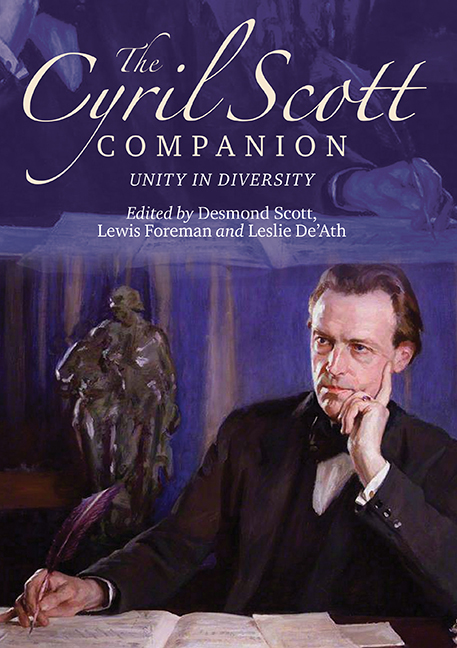Book contents
- Frontmatter
- Dedication
- Contents
- List of Illustrations
- List of Tables
- List of Contributors
- Foreword
- Preface
- Acknowledgements
- Editors' Note
- I SCOTT IN CONTEXT
- II THE MUSIC
- III THE WRITINGS
- 17 The Poetry
- 18 The Occult Writings
- 19 The Purpose of The Boy Who Saw True
- 20 Near the End of Life: Candid Confessions and Reflections: A Discussion of the Memoir
- 21 The Therapeutic Books
- 22 Childishness or The Moron Mind
- 23 A Note on the Plays
- IV PERSONAL REMINISCENCES
- APPENDICES
- CATALOGUES, DISCOGRAPHY AND BIBLIOGRAPHY
- Index of Works
- General Index
23 - A Note on the Plays
from III - THE WRITINGS
Published online by Cambridge University Press: 14 September 2019
- Frontmatter
- Dedication
- Contents
- List of Illustrations
- List of Tables
- List of Contributors
- Foreword
- Preface
- Acknowledgements
- Editors' Note
- I SCOTT IN CONTEXT
- II THE MUSIC
- III THE WRITINGS
- 17 The Poetry
- 18 The Occult Writings
- 19 The Purpose of The Boy Who Saw True
- 20 Near the End of Life: Candid Confessions and Reflections: A Discussion of the Memoir
- 21 The Therapeutic Books
- 22 Childishness or The Moron Mind
- 23 A Note on the Plays
- IV PERSONAL REMINISCENCES
- APPENDICES
- CATALOGUES, DISCOGRAPHY AND BIBLIOGRAPHY
- Index of Works
- General Index
Summary
ADAPTATIONS excepted, Cyril Scott wrote plays with one thought uppermost: how to expand his audience by presenting his ideas in a different format, a format that gave him scope to write prefaces and programme notes to amplify his message. He wrote thirteen plays and three adaptations. His first original play Prigs in Clover, written 1926–7, was set to be produced in the West End the following year with one of the leading actors of the day, Dennis Eadie, but circumstances prevented that from happening, and Eadie unexpectedly died before it could be rescheduled.
A Victorian comedy set in the 1880s, the play's major theme is ‘What will people think?’ It deals with a stereotypical Victorian couple who demonstrate many of the qualities the Victorians were thought to have, among them conventionality, sanctimoniousness and hypocrisy. Scott's ‘ideal’ man, a character who also features in some of the later plays, makes his first appearance. Tolerant, easy-going, totally unprejudiced, eminently reasonable and unconventional, he is always in contrast to the rest of the cast. Here called John, he discovers that his wife, Evelyn, has fallen in love with another man. He is unperturbed:
Evelyn: Aren't you the least bit angry or jealous? I thought all men were jealous?
John: My dear, jealousy is all very well for primitive people who haven't the brains to know better – and it may be excusable to some extent in persons who've only been married a week; but under all other circumstances it is childish and after some years, that wild romantic passion that so often seems to inspire jealousy, simmers down into a calm affectionate friendship or love like ours, now doesn't it?
He then gives Evelyn a speech that has real feeling and is the most genuine in the whole play:
Evelyn: Ah, but it's just that simmering down which is so hard for a woman … Do you know what it's like to sit in front of a low fire late at night, and gradually watch it die – feel all its lovely glow fading and leaving you chilled and sad? That's what a woman feels like when she realises that the glow has gone out of her husband's love, and that never again will she hear him say ‘I love you’ as he used to when he was first in love with her.
- Type
- Chapter
- Information
- The Cyril Scott CompanionUnity in Diversity, pp. 381 - 386Publisher: Boydell & BrewerPrint publication year: 2018

